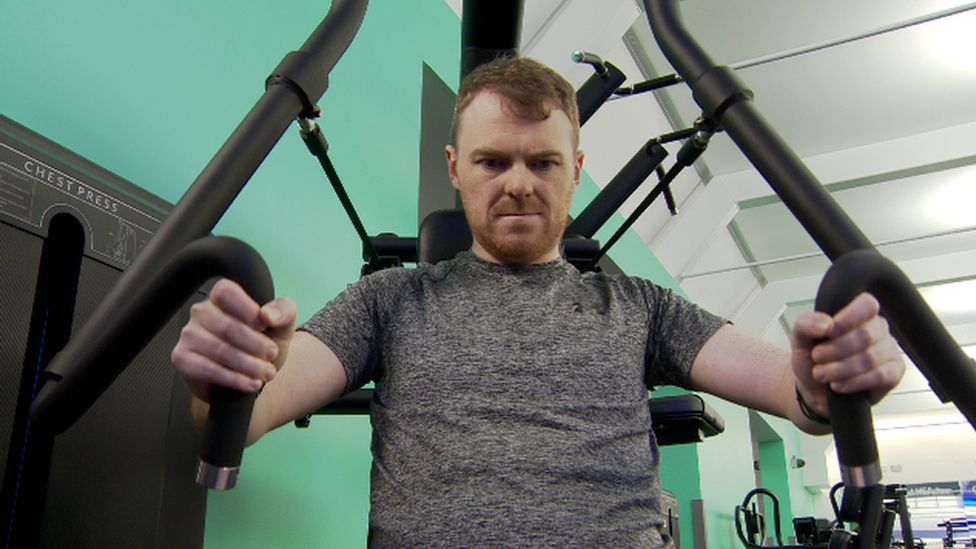ARTICLE AD BOX

David Reid first noticed issues with his bowel in 2019
By Rory O'Reilly
BBC News NI health reporter
A 32-year-old man who waited seven months for treatment after his bowel cancer recurred has said he feared it would spread by the time he was seen.
David Reid from Ballymena has Crohn's Disease - a condition where parts of the digestive system become inflamed.
The number of people in Northern Ireland waiting more than two months to start cancer treatment is 12% higher than the same time last year.
The latest statistics were published on Thursday.
Mr Reid first noticed issues with his bowel in 2019 when treatment for his Crohn's stopped working.
He was told he needed to have part of his small bowel removed - it was then that doctors noticed his cancer.
"It was a shock but I saw it as a bump in the road that I would get over," Mr Reid, who is an Alliance representative on Mid and East Antrim Borough Council, explained.
"I had ileostomy surgery to give me a temporary stoma alongside chemotherapy treatment.
"I went through 12 rounds of chemo and things progressed well. I was in good health and had my procedure reversed in April 2022."
But then Mr Reid received the news he had been dreading, that his cancer was back.
Speaking to BBC News NI, he said there was a noticeable change in the treatment he received compared to when he was first diagnosed and to a point where he considered going private.
'Passed from pillar to post'
"By June 2022 I was starting to have some new symptoms, different to the bladder issues I'd had before," Mr Reid continued.
"I saw my GP and had tests. Weeks passed and after calling the GP they said I could be waiting for six months to be seen.
"I started to look at private care as an option as I couldn't face months more of waiting and worrying but out of the blue an appointment came through the door from the health service."
Mr Reid eventually had surgery at the end of January and has been told there is no sign of cancer
In the end it took seven months from reporting his symptoms to his GP before Mr Reid had major, life-changing surgery to treat the recurrence of cancer.
"It was long and I was passed from pillar to post," he said. "And of course I'm sat at home wondering will my cancer spread and when will I actually be able to get surgery.
"Many people were seemingly involved in my care but I wasn't one of them. Communication was so disjointed.
"I finally spoke to an oncologist about my second diagnosis for the first time last week, months after surgery.
"Why didn't that happen sooner?"
'The system has let me down'
However, Mr Reid does not point the blame at individuals.
"I cannot fault our healthcare professionals who are doing everything thing they can with the resources they have," he said.
"It is the system that has let me and many others down. There are people like me on lists in every trust in Northern Ireland - it shouldn't be this way."
Eventually Mr Reid had surgery at the end of January and has been told there is no sign of cancer.
He is now starting to get his life back on track and started a new job with the charity MacMillan Cancer Support.
Earlier this week he signed up to its 'Move More' programme which supports people living with cancer to get active and stay active.
The scheme allows people to go at their own pace and find things that they enjoy that will improve their lives and is available in every council area across Northern Ireland.
Mr Reid spoke to BBC News NI ahead of the quarterly cancer figures released this morning.
'Worst cancer waiting times'
On Thursday, the Department of Health (DoH) published the cancer waiting times for the quarter ending December 2022.
During this period, they found that 1,387 patients had to wait at least two months to start treatment following an urgent GP referral, 149 (12%) more than in the same quarter last year (1,238).
Last March, the former health minister Robin Swann launched a cancer strategy which provides the strategic direction for the transformation of cancer services over the next decade.
The department said "it is extremely disappointing that the department's performance targets for cancer waiting times are not being met".
"The length of time patients in Northern Ireland were waiting for assessment, diagnosis and treatment for cancer was increasing before the pandemic and this has been exacerbated in the past three years," a spokesperson continued.
They explained that two rapid diagnosis centres had been launched at Whiteabbey Hospital and South Tyrone Hospital in December under its 10-year strategy, while elective overnight stay centres for patients requiring intermediate complexity surgery and a stay of up to three days were being developed.
Sarah Christie, from the charity Macmillan in Northern Ireland, described the figures as the worst cancer waiting times ever recorded there.
"The NI Cancer Strategy needs implemented and funded now," she said.
"We are running out of time - the longer we're without a health minister, budgets and governance, the worse the outcomes will be for everyone living with cancer in NI."

 2 years ago
83
2 years ago
83








 English (US) ·
English (US) ·